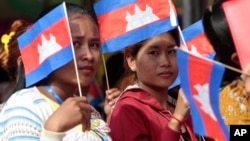Labor Minister Ith Samheng has promised garment workers more rights amid an ongoing push by the ruling Cambodian People’s Party to court the crucial voters ahead of next year’s election.
In a statement on Monday, Samheng made the announcement after meeting with Peter McAllister, CEO of the Ethical Trading Initiative (ETI), which represents numerous major buyers of Cambodian garments.
Samheng told McAllister the government was making improvements to labor dispute resolution by introducing trilateral seminars and better reconciliation methods, as well as plans to further increase the minimum wage each year.
The government would also review decisions to grant privileges to minority unions and organize national seminars to review and amend legal procedures.
Union leaders welcomed the decision as an adequate response to demands.
“What the Minister of Labor has agreed to ... is so great that it is also linked to political issues that the U.S. urges Cambodia to respect workers rights,” said Pav Sina, president of the Collective Union of Movement of Workers.
“I think it’s a good opportunity for the labor ministry to respond positively.”
He added that several other issues needed to be addressed, such as short-term contracts, the use of which he said was on the rise, the issue of unsafe transport, access to health care services, and factories closing without providing workers compensation.
“What is more important is a transparent inspection from experts in the factories and enterprises. We have to ... adapt standard factory rules, meaning that the working environment must be comfortable with no chemical smells. This is still a problem,” he added.
U.S. and E.U. leaders have urged Cambodia to improve garment workers rights following this year’s increase in the minimum wage to $170 per month.
Cambodia’s garment sector employs more than 700,000 workers and exported more than $6 billion worth of goods in 2016.







